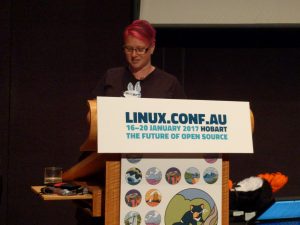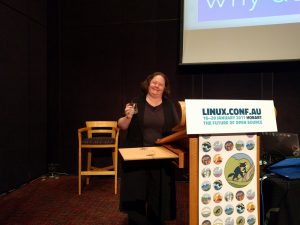Content as a driver of change: then and now – Lana Brindley
 Humans have always told stories
Humans have always told stories- Cave Drawings
- Australian Indigenous art is the oldest continuous art in the world
- Stories of extinct mega-fauna
- Stories of morals but sometimes also funny
- Early Written Manuals
- We remember the Eureka
- Religious Leaders
- Gutenburg
- Bible was only redistributed book, restricted to clergy
- Fairy Tales
- Charles Perrault versions.
- Brother Grim
- Cautionary tales for adults
- Very gruesome in the originals and many versions
- Easiest and entertaining way for illiterate people to share moral stories
- Master and Apprentice
- Cheap Labour and Learn a Trade
- Journals and Letters
- In the early 19th century letter writing started happoning
- Recipe Books
- Recently
- Paper Manuals
- Traditionally the proper method for technical docs
- Whitepapers
- Printed version will probably go away
- Digital form may live on
- Training Courses
- Face to face training has it’s benifits
- Online is where techical stuff is moving
- Online Books
- Online version of a printed book
- Designed to be read from beginning to end, TOC, glossary, etc
- Today
- MOOCS
- Quite common
- Data Typing (DITA)
- Break down the content into logical pices
- Store in a database
- Mix on the fly
- Doing this sort of the since 1960s and 1970s
- Single Sourcing
- Walked away from old idea of telling a story
- Look at how people consumed and learnt difficult concepts
- Deliver the same content many ways (beginner user, advanced, reference)
- Chunks of information we can deliver however we like
- User-Side Content Curation
- Organised like a wikipedia article
- Imagine a side listing lots of cars for sale, the filters curate the content
- What comes next?
- Large datasets and let people filter
- Power going from producers to consumers
- Consumers want to filter themselves, not leave the producers to do this
- References and further reading for talk
I am your user. Why do you hate me? Donna Benjamin
- Free and open source software suffers from poor usability
- We’ve struggled with open source software, heard devs talk about users with contempt
- We define users by what they can’t do
- How do I hate thee let I count the ways
- Why were we being made to feel stupid when we used free software
- Software is “made by me for me”, just for brainiac me
- Lots of stories about stupid users. Should we be calling our users stupid?
- We often talk/draw about users as faceless icons
- Take pride in having prickly attitudes
- Users
- Whiney, entitled and demanding
- We wouldn’t want some of them as friends
- Not talk about those sort of users
- Lets Chat about chat
- Slack – used by OS projects, not the freest, propritory
- Better in many ways less friction, in many ways
- Steep Learning curves
- How long to get to the level of (a) Stop hating it? (b) Are Kicking ass
- How do we get people over that level as quickly as possible
- They don’t want to be badass at using your tool. They want you to be badass at what using your tool allows them to do
- Badass: Making Users Awesome – Kathy Sierra
- Perfect is the enemy of the good
- Understand who your users are; see them as people like your friends and colleagues; not faceless icons